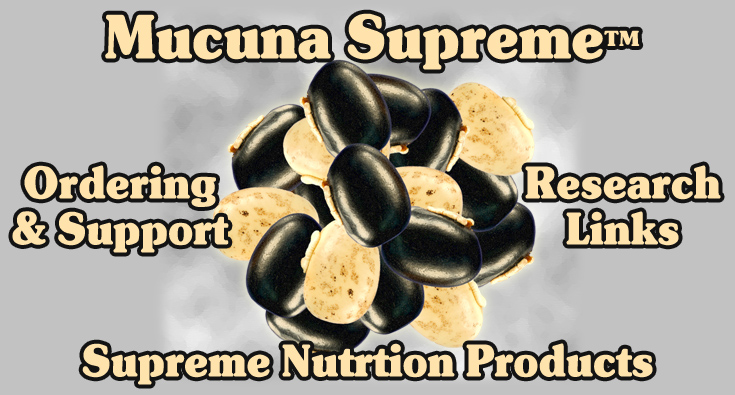
Mucuna Supreme is made from the seeds of the velvet-bean, Mucuna pruriens, which is native to tropical and subtropical regions. It has been used as a green cover-crop and livestock forage due to the high protein content of its seeds (1).
Mucuna’s use as a medicinal plant dates back thousands of years. It been used to treat a wide variety of conditions including high blood pressure, low sperm count, low libido, male infertility, diabetes, and neurodegenerative conditions like Parkinson’s disease, and has been shown to have marked antioxidant activity (2).
Mucuna has marked ACE inhibiting properties, making its action similar to some pharmaceutical drugs designed to lower blood pressure (3).
There are many studies showing the positive effects of Mucuna on increasing sperm count and sperm motility (4, 5), as well as helping normalize healthy libido (6, 7) and helping treat male infertility (8, 9, 10, 11). Mucuna also has some promising research in treating erectile dysfunction in men (12).
Some of Mucuna’s most famous effects are on the dopaminergic centers of the brain. Mucuna contains 4-7% L-Dopa which is the immediate precursor to Dopamine (13). Dopamine is an important neurotransmitter that helps people to feel a sense of satiety and contentment. When people feel a greater sense of contentment and connectedness, they tend to have less anxiety and can side-step stress more effectively. Mucuna has been shown in countless studies to raise dopamine levels in the brain. Parkinson’s disease is a condition where the dopamine producing centers of the brain are damaged and not enough dopamine is produced. These patients are often treated with dopamine-enhancing drugs like Levodopa, often with difficult side effects. Patients who take Mucuna, however, get the benefit of the dopamine producing effects of Mucuna but without many of the difficult side effects of these pharmaceuticals (14, 15). The L-Dopa content may also be used to help those suffering from depression (16). The L-Dopa found in mucuna can also be converted into epinephrine, helping those suffering from fatigue.
In addition to Parkinson’s disease, Mucuna has been studied for other movement disorders like Epilepsy, and initial research has shown positive benefi ts (17).
Mucuna has been shown to have anti-parasitic activity (18) as well as anti-neoplastic activities against liver cancer (19).
Additionally there have been several studies showing that Mucuna has the ability to lower blood sugar and so its use has been proposed to helping treat diabetes and insulin resistance (20, 21, 22, 23, 24).
Safety Caution in patients with a personal or family history of melanoma and patients with a personal history of low blood sugar (hypoglycemia). Also Mucuna helps lower blood pressure, so it is not recommended in patients with low blood pressure.
Additionally there is minimal safety data on Pregnancy and Lactation so Mucuna is best avoided during these times.
Dosage
One cap on awakening, at least 30 minutes before food. Two caps may be needed but ask your physician before increasing.
Do not go off of your prescribed Parkinson’s drugs and replace them with Macuna. There have not been enough studies to support this. Always work with your physician to utilize their expertise.
Citations:
1. J Tradit Complement Med. 2012 Oct-Dec; 2(4): 331–339.
2. J Med Food. 2013 Jul;16(7):618-24. doi: 10.1089/jmf.2012.269
3. Pharm Biol. 2015 Apr 14:1-7
4. PLoS One. 2013;8(1):e54655. doi: 10.1371/journal.pone.0054655. Epub 2013 Jan 22
5. J Complement Integr Med. 2012 Feb 17;9:Article 6. doi: 10.1515/1553-3840.1520
6. J Sex Med. 2012 Dec;9(12):3066-78. doi: 10.1111/j.1743-6109.2010.01831.x. Epub 2010 Apr 26
7. J Ethnopharmacol. 2009 Apr 21;122(3):497-501. doi:10.1016/j.jep.2009.01.032. Epub 2009 Jan 31
8. Fertil Steril. 2009 Dec;92(6):1934-40. doi: 10.1016/j.fertnstert.2008.09.045. Epub 2008 Oct 29
9. J Pharm Biomed Anal. 2011 Jul 15;55(5):1060-6. doi: 10.1016/j.jpba.2011.03.010. Epub 2011 Mar 11
10. Fertil Steril. 2008 Sep;90(3):627-35. Epub 2007 Nov 14
11. J Ethnopharmacol. 2013 Jan 9;145(1):32-41. doi: 10.1016/j.jep.2012.10.030. Epub 2012 Oct 26
12. J Sex Med. 2011 Jul;8(7):1943-56. doi: 10.1111/j.1743-6109.2011.02221.x. Epub 2011 Mar 2
13. J Tradit Complement Med. 2012 Oct-Dec; 2(4): 331–339.
14. J Neurol Neurosurg Psychiatry 2004;75:1672–1677. doi:10.1136/jnnp.2003.028761
15. Neurochem Int. 2014 Jan;65:1-13. doi: 10.1016/j.neuint.2013.12.001. Epub 2013 Dec 11
16. Pati, Dipanwita, et al. “Antidepressant like activity of Mucuna Pruriens; a traditional Indian herb in rodent models of depression.” Pharmacologyonline 1 (2010): 537-551.
17. Indian J Pharmacol. 2011 Apr;43(2):197-9. doi: 10.4103/0253-7613.77368
18.Parasitol Res. 2004 Mar;92(5):361-6. Epub 2004 Jan 21
19. Nat Prod Res. 2015 Mar 16:1-4
20. Gulati et al. BMC Complementary and Alternative Medicine 2012, 12:77
21. Fitoterapia. 2008 Dec;79(7-8):539-43. doi: 10.1016/j.fi tote.2008.05.008. Epub 2008 Jul 10
22. Neurochem Int. 2013 Jun;62(8):1039-47. doi: 10.1016/j.neuint.2013.03.015. Epub 2013 Apr 3
23. Evidence-Based Complementary and Alternative Medicine Volume 2012, Article ID 840247, 10 pages doi:10.1155/2012/840247
24. Neurotox Res. 2009 Feb;15(2):111-22. doi: 10.1007/s12640-009-9011-7. Epub 2009 Feb 20
Back to the Supreme Nutrition Products Home Page